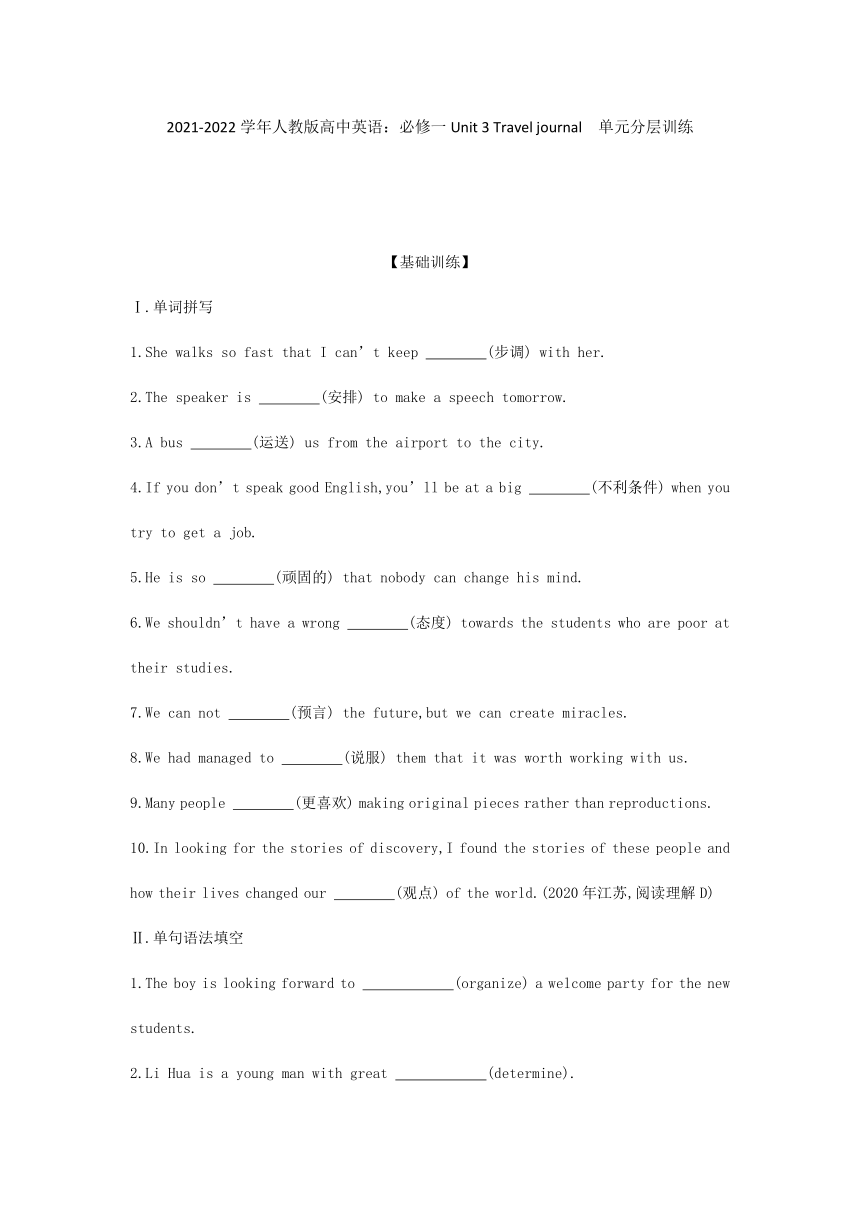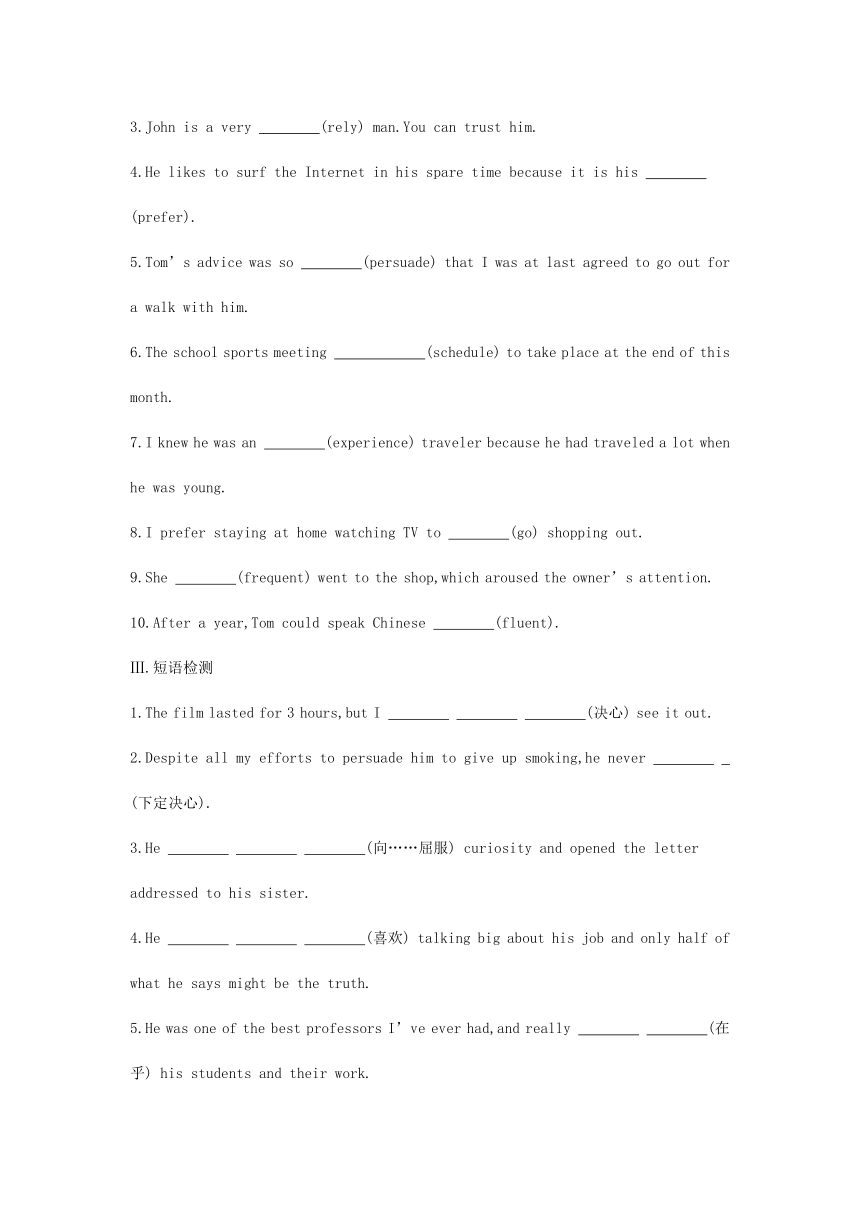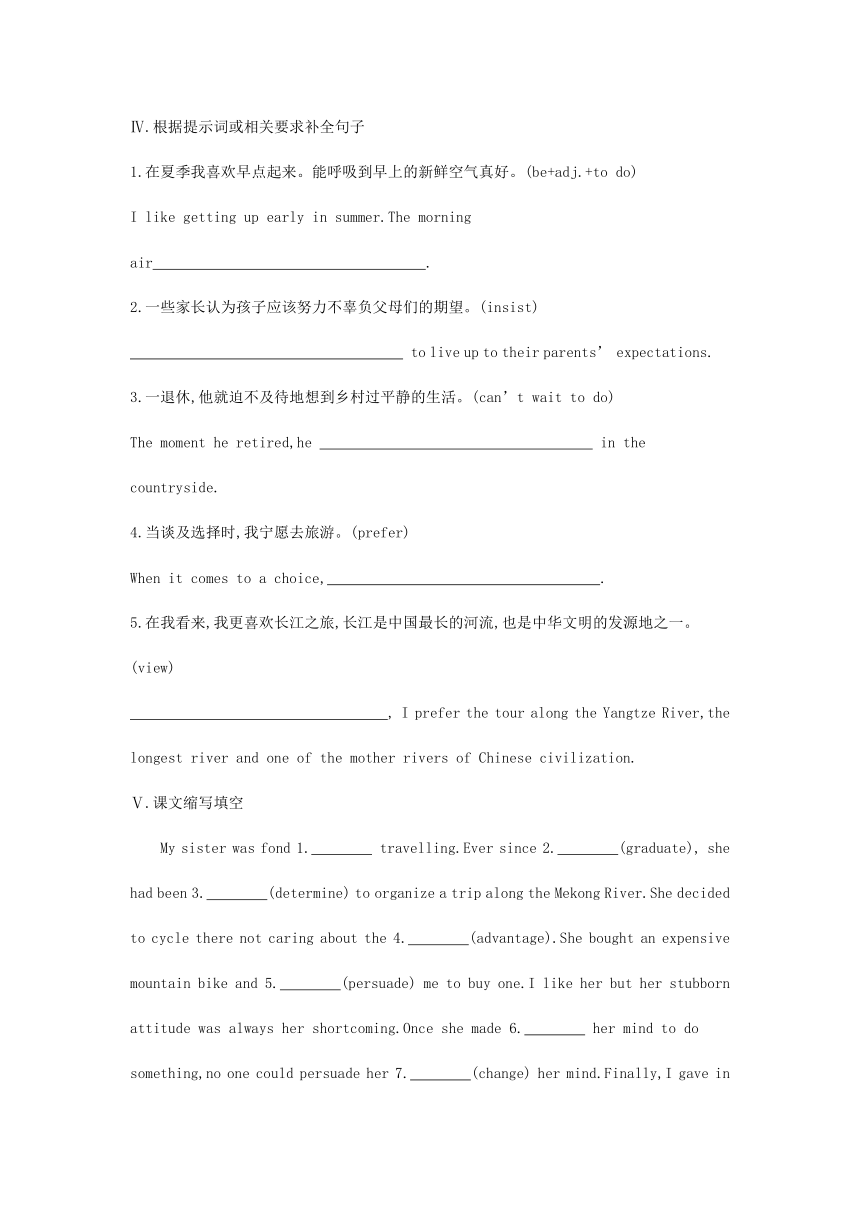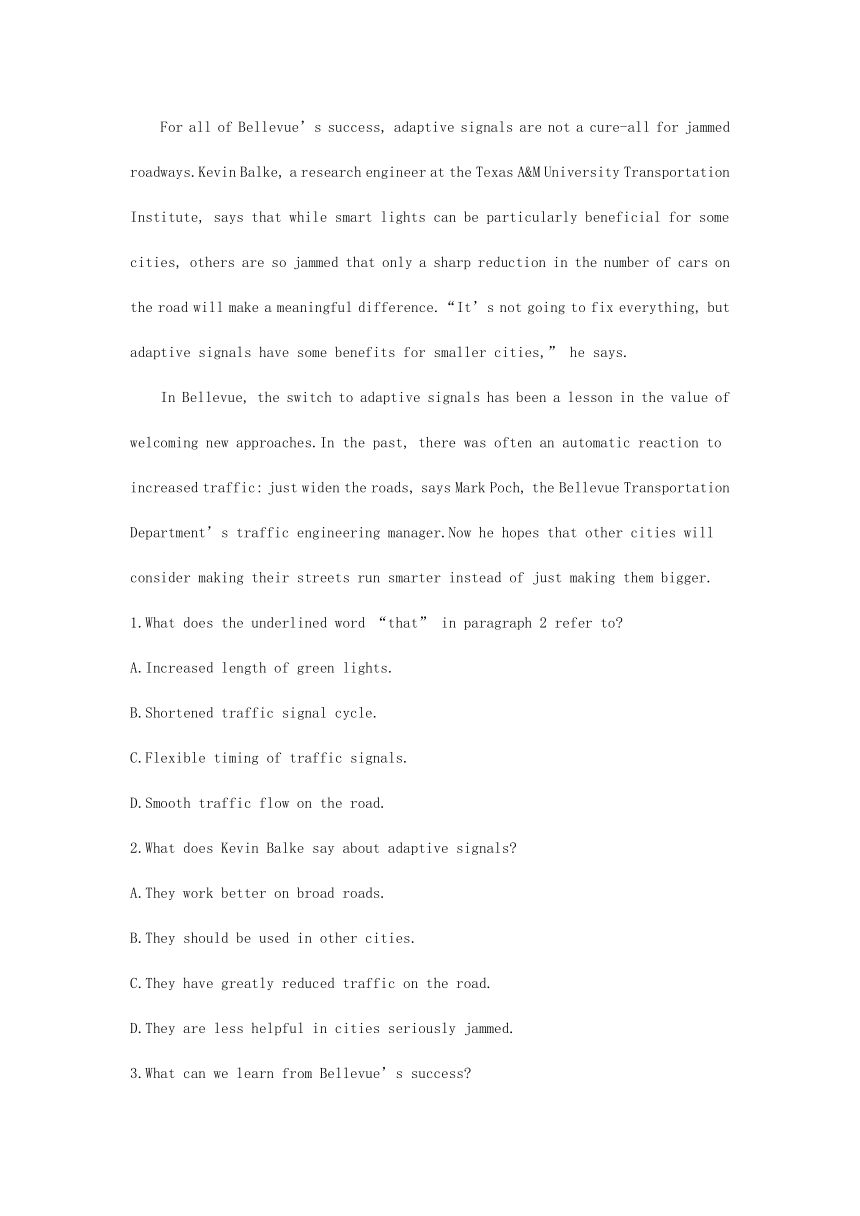2021-2022学年人教版高中英语:必修一 Unit 3 Travel journal 单元分层训练(含答案 无听力与写作试题)
文档属性
| 名称 | 2021-2022学年人教版高中英语:必修一 Unit 3 Travel journal 单元分层训练(含答案 无听力与写作试题) |

|
|
| 格式 | docx | ||
| 文件大小 | 31.9KB | ||
| 资源类型 | 教案 | ||
| 版本资源 | 人教版(新课程标准) | ||
| 科目 | 英语 | ||
| 更新时间 | 2021-08-17 09:41:35 | ||
图片预览





文档简介
2021-2022学年人教版高中英语:必修一Unit 3 Travel journal 单元分层训练
【基础训练】
Ⅰ.单词拼写
1.She walks so fast that I can’t keep (步调) with her.?
2.The speaker is (安排) to make a speech tomorrow.?
3.A bus (运送) us from the airport to the city.?
4.If you don’t speak good English,you’ll be at a big (不利条件) when you try to get a job.?
5.He is so (顽固的) that nobody can change his mind.?
6.We shouldn’t have a wrong (态度) towards the students who are poor at their studies.?
7.We can not (预言) the future,but we can create miracles.?
8.We had managed to (说服) them that it was worth working with us.?
9.Many people (更喜欢) making original pieces rather than reproductions.?
10.In looking for the stories of discovery,I found the stories of these people and how their lives changed our (观点) of the world.(2020年江苏,阅读理解D)?
Ⅱ.单句语法填空
1.The boy is looking forward to (organize) a welcome party for the new students.?
2.Li Hua is a young man with great (determine).?
3.John is a very (rely) man.You can trust him.?
4.He likes to surf the Internet in his spare time because it is his (prefer).?
5.Tom’s advice was so (persuade) that I was at last agreed to go out for a walk with him.?
6.The school sports meeting (schedule) to take place at the end of this month.?
7.I knew he was an (experience) traveler because he had traveled a lot when he was young.?
8.I prefer staying at home watching TV to (go) shopping out.?
9.She (frequent) went to the shop,which aroused the owner’s attention.?
10.After a year,Tom could speak Chinese (fluent).?
Ⅲ.短语检测
1.The film lasted for 3 hours,but I (决心) see it out.?
2.Despite all my efforts to persuade him to give up smoking,he never (下定决心).?
3.He (向……屈服) curiosity and opened the letter addressed to his sister.?
4.He (喜欢) talking big about his job and only half of what he says might be the truth.?
5.He was one of the best professors I’ve ever had,and really (在乎) his students and their work.?
Ⅳ.根据提示词或相关要求补全句子
1.在夏季我喜欢早点起来。能呼吸到早上的新鲜空气真好。(be+adj.+to do)
I like getting up early in summer.The morning air .?
2.一些家长认为孩子应该努力不辜负父母们的期望。(insist)
to live up to their parents’ expectations.?
3.一退休,他就迫不及待地想到乡村过平静的生活。(can’t wait to do)
The moment he retired,he in the countryside.?
4.当谈及选择时,我宁愿去旅游。(prefer)
When it comes to a choice, .?
5.在我看来,我更喜欢长江之旅,长江是中国最长的河流,也是中华文明的发源地之一。(view)
, I prefer the tour along the Yangtze River,the longest river and one of the mother rivers of Chinese civilization.?
Ⅴ.课文缩写填空
My sister was fond 1. travelling.Ever since 2. (graduate), she had been 3. (determine) to organize a trip along the Mekong River.She decided to cycle there not caring about the 4. (advantage).She bought an expensive mountain bike and 5. (persuade) me to buy one.I like her but her stubborn attitude was always her shortcoming.Once she made 6. her mind to do something,no one could persuade her 7. (change) her mind.Finally,I gave in as 8. (usually) and agreed to travel as she had organized.After we prepared everything,we began our trip.During the journey,we enjoyed the beautiful scenery of glaciers,deep valleys,waterfalls,plains and the 9. (continue) change of the weather.Finally,we reached Dali in Yunnan Province,10. Dao Wei and Yu Hang joined us.The four of us went on with the great bike trip.This was a really interesting experience.?
【能力提升】
Ⅰ.阅读理解
(2020年7月浙江,阅读理解B)
The traffic signals along Factoria Boulevard in Bellevue, Washington, generally don’t flash the same length of green twice in a row, especially at rush hour.At 9:30 am, the full red/yellow/green signal cycle might be 140 seconds.By 9:33 am, a burst of additional traffic might push it to 145 seconds.Less traffic at 9:37 am could push it down to 135.Just like the traffic itself, the timing of the signals changes.
That is by design.Bellevue, a fast-growing city just east of Seattle, uses a system that is gaining popularity around the US:intersection(十字路口) signals that can adjust in real time to traffic conditions.These lights, known as adaptive signals, have led to significant declines in both the trouble and cost of travels between work and home.
“Adaptive signals can make sure that the traffic demand that is there is being addressed,” says Alex Stevanovic, a researcher at Florida Atlantic University.
For all of Bellevue’s success, adaptive signals are not a cure-all for jammed roadways.Kevin Balke, a research engineer at the Texas A&M University Transportation Institute, says that while smart lights can be particularly beneficial for some cities, others are so jammed that only a sharp reduction in the number of cars on the road will make a meaningful difference.“It’s not going to fix everything, but adaptive signals have some benefits for smaller cities,” he says.
In Bellevue, the switch to adaptive signals has been a lesson in the value of welcoming new approaches.In the past, there was often an automatic reaction to increased traffic: just widen the roads, says Mark Poch, the Bellevue Transportation Department’s traffic engineering manager.Now he hopes that other cities will consider making their streets run smarter instead of just making them bigger.
1.What does the underlined word “that” in paragraph 2 refer to?
A.Increased length of green lights.
B.Shortened traffic signal cycle.
C.Flexible timing of traffic signals.
D.Smooth traffic flow on the road.
2.What does Kevin Balke say about adaptive signals?
A.They work better on broad roads.
B.They should be used in other cities.
C.They have greatly reduced traffic on the road.
D.They are less helpful in cities seriously jammed.
3.What can we learn from Bellevue’s success?
A.It is rewarding to try new things.
B.The old methods still work today.
C.It pays to put theory into practice.
D.The simplest way is the best way.
Ⅱ.七选五
(2021届嘉兴9月联考)
Let’s just be honest.1. Given the limited space that comes with an economy class seat,you can expect to sit for hours with a stiff(僵硬的) neck and back,which has a bad effect on your circulation.While most people know that standing up and walking around during your flight can encourage your blood flow,it’s not always possible or convenient to do so.2. ?
Confused? Just hear us out.Tennis balls can put any fancy and expensive things to shame when it comes to killing pain,relieving(减轻)tightness,and improving circulation on long flights or road trips.This is why you should always pack a tennis ball for your trip.
3. It is practically the on-the-go self-massage(自我按摩) you never knew you needed.Not only are tennis balls tiny enough to fit into a small bag,but also using one during a flight won’t bother your neighbors either.And luckily,it’s most likely not one of the things to get you flagged in the security line.?
There are certain areas you should target when performing a self-massage.4. They are your ankles,wrists,legs,upper back and shoulders.Apply gentle pressure to each area with the ball as you roll,and use extra care with any spots of tension.?
Seems simple enough,right?5. Always remember to fly with a tennis ball in your carry-on.?
A.That’s where a tennis ball comes in.
B.These days,airplanes can barely fit your own two legs.
C.Some key body parts are especially in need of your attention.
D.People are flying with just one piece of carry-on luggage nowadays.
E.But it could make your life much easier and keep you healthier in the air.
F.Just make sure you’re not making these airport mistakes before your next flight.
G.Rolling a tennis ball along your body loosens up stiff parts and increases the blood flow.
Ⅲ.完形填空
(2019年6月浙江)
There are lots of ways to raise awareness for a cause.Usually,the 1 the idea is,the more it gets noticed.And that’s precisely why one 2 Frenchman has caught our attention.?
Baptiste Dubanchet is biking across Europe,surviving 3 on discarded(丢弃)food.The three-month,1,900-mile journey from Paris to Warsaw is Dubanchet’s 4 of raising awareness of food waste in Europe and throughout the world.?
As you can 5 ,the trip is no piece of cake.While restaurants 6 tons of food each year,much of it remains inaccessible because of 7 garbage containers, health regulations,or business policies.Only about one in ten places 8 him food that would otherwise be discarded.For legal 9 ,most restaurants have a policy against 10 food waste.“Some people have even 11 their jobs by giving me food,”Dubanchet said.?
What’s 12 interesting is the attitude various cities have toward Dubanchet’s cause.Berlin has been the 13 while the most difficult was the Czech town of Pilsen.There,he had to 14 at some 50 different stores or restaurants before finding food.The 15 is all the more serious when you consider the 16 exercise required to bike from France to Poland.?
“I have to get food 17 because after all the biking I am tired and I need the 18 ,”Dubanchet explained.“Is my 19 full or empty?That is the most important thing,not what I am eating.”?
He aims to 20 his journey by mid-July.With any luck,he’ll turn a few more heads in the process.?
1.A.cleverer B.older C.stranger D.simpler
2.A.garbage-eating B.sports-loving C.food-wasting D.law-breaking
3.A.secretly B.finally C.entirely D.probably
4.A.purpose B.way C.opinion D.dream
5.A.observe B.imagine C.suggest D.remember
6.A.store B.cook C.shop for D.throw away
7.A.locked B.damaged C.connected D.abandoned
8.A.bought B.offered C.ordered D.sold
9.A.reasons B.rights C.fees D.aids
10.A.begging for B.giving away C.hiding D.causing
11.A.did B.kept C.accepted D.risked
12.A.hardly B.usually C.particularly D.merely
13.A.easiest B.nearest C.biggest D.richest
14.A.work B.shout C.ask D.jump
15.A.competition B.conversation C.conflict D.challenge
16.A.adequate B.rewarding C.demanding D.suitable
17.A.again B.alone C.later D.fast
18.A.spirit B.energy C.time D.effort
19.A.stomach B.hand C.pocket D.basket
20.A.arrange B.restart C.report D.finish
参考答案
【基础训练】
Ⅰ.单词拼写
1.pace 2.scheduled 3.transported 4.disadvantage 5.stubborn 6.attitude 7.forecast 8.persuade 9.prefer 10.view
Ⅱ.单句语法填空
1.organizing 2.determination 3.reliable 4.preference 5.persuasive 6.is scheduled 7.experienced 8.going 9.frequently 10.fluently
Ⅲ.短语检测
1.was determined to 2.made up his mind 3.gave in to 4.is fond of 5.cared about
Ⅳ.根据提示词或相关要求补全句子
1.is so good to breathe 2.Some parents insist that children should make every effort 3.couldn’t wait to live a peaceful life 4.I prefer to go travelling 5.In my view/From my point of view
Ⅴ.课文缩写填空
1.of 2.graduating/graduation 3.determined 4.disadvantages 5.persuaded 6.up 7.to change 8.usual 9.continuous 10.where
【能力提升】
Ⅰ.阅读理解
1.C 词义猜测题。考查考生在特定语境下推测特定单词意义的能力。该句对文章的第一、二段起到承上启下的作用,因此that是文章第一段中所说到的具体现象。根据文章第一段最后一句“Just like the traffic itself,the timing of the signals changes.(信号灯的时间间隔就像交通一样,一直在变化)”可知,C选项(灵活的交通信号灯时间)符合题意。
2.D 细节理解题。考查考生理解和识别具体文本信息的能力。由题干中的“Kevin Balke”和“adaptive signals”可以定位到文章第四段。根据第四段中的“while smart lights can be particularly beneficial for some cities,others are so jammed that only a sharp reduction in the number of cars on the road will make a meaningful difference(虽然智能信号灯对一些城市尤其有利,但在其他交通拥堵非常严重的城市,只有大幅减少道路上的汽车数量,才会产生有意义的改变)”可知,自适应信号灯在严重拥堵的城市发挥不了多大的作用,故选D项。
3.A 推理判断题。考查考生理解文本具体信息并归纳概括的能力。据文章最后一段中的“In Bellevue,the switch to adaptive signals has been a lesson in the value of welcoming new approaches.(在贝尔维尤,向自适应信号灯的这个转变,让我们体会到接受新方法的积极作用)”可知,贝尔维尤使用自适应信号灯是一个新方法的尝试,并且让城市获益。由此可推知A选项(尝试新事物是值得的)符合题意。
Ⅱ.七选五
1.B 考查考生对上下文的理解和推理判断能力。根据下文“考虑到经济舱座位的空间有限……颈部和背部僵硬,这会对您的血液循环产生不良影响”可知,飞机上空间很小,坐着很不舒服。因此,B选项“现在,飞机几乎连你自己的两条腿都装不下了”符合上下文的语境。
2.A 考查考生对上下文的理解和推理判断能力。根据本段设空处前的“虽然大多数人都知道,在飞行过程中站起来走动可以促进血液循环,但这样做并不总是可行或方便的”和下文中的“当涉及到止痛、缓解紧绷、改善长途飞行或公路旅行途中的血液循环时,网球可以让任何花哨昂贵的东西相形见绌。这就是为什么你旅行时应该带一个网球”可知,文章认为,网球可以帮助人们在不方便站起来走动时,缓解身体不适,促进血液循环。因此A选项“那就是网球的作用”承接上下文,符合文意。
3.G 考查考生对上下文的理解和推理判断能力。根据下文“实际上,这是一种你从来不知道自己需要的在路上的自我按摩”可知,本段介绍的是用网球自我按摩,可以缓解肌肉僵硬,能促进血液循环。因此,G选项“沿着身体滚动网球可以放松僵硬部位,增加血液流动”符合本段的主旨。
4.C 考查考生对上下文的理解和推理判断能力。根据上一句“在进行自我按摩时,你应该针对某些特定的区域”和下两句“它们是你的脚踝、手腕、腿、上背部和肩膀。当你滚动时,用球轻轻地按压每个区域,对任何紧绷点都要格外小心”可知,自我按摩时,有些地方要注意。因此,C选项“一些关键的身体部位特别需要你的注意”承接上下文,符合文意。
5.E 考查考生对上下文的理解和推理判断能力。设空处上一句是“看起来很简单,对吧?”而E选项“但是它可以让你的生活更轻松,让你在乘飞机旅行时更健康”通过转折关系来强化说明网球按摩的好处,符合上下文语境。
Ⅲ.完形填空
1.C 引起人们对一项事业的关注有很多种方式。通常来说,想法越奇怪(stranger),得到的关注也越多。根据下文所述,骑行过程中以垃圾为食是一种奇怪行为。
2.A 根据第二段中的surviving...on discarded food(以丢弃的食物为食)可知,这个法国人靠捡垃圾为食。这就是一个吃垃圾的(garbage-eating)法国人引起我们注意的原因。
3.C Baptiste Dubanchet骑行穿越欧洲,途中完全(entirely)靠吃人们丢弃的食物为生。
4.B 由第一段第一句“There are lots of ways to raise awareness for a cause.(引起人们对一项事业的关注有很多种方式)”可知,从巴黎到华沙,历时三个月,骑行1 900英里,这就是Dubanchet引起欧洲和世界对食物浪费这一现象的关注的方式(way)。
5.B 正如你能想象(imagine)的,这趟骑行之旅并不容易。
6.D 根据上下文可知,饭店每年都要丢掉(throw away)大量的食物。
7.A 虽然饭店每年都会丢掉大量的食物,但由于垃圾箱被锁(locked)、健康法规或商业政策的限制,大部分被丢弃的食物是不容易获得的。
8.B 只有大约十分之一的地方为他提供了(offered)会丢弃的食物。
9.A 根据下文可知,送给别人被丢弃的食物是法律不允许的,因此此处指“出于法律原因(reasons)”。
10.B 大多数饭店都有政策禁止送给(giving away)别人被丢弃的食物。
11.D 有些人因为给“我”食物而冒着丢掉工作的风险(risked)。
12.C 特别(particularly)有趣的是,各个城市对Dubanchet事业的态度。
13.A 根据后面的while the most difficult was the Czech town of Pilsen可知,前面应该是与最困难的对比,因此柏林是最容易(easiest)得到食物的城市。
14.C 在最难获得食物的镇上,他要询问(ask)大约50家不同的商店或餐馆,才能找到食物。
15.D 他要询问大约50家商店或餐馆有没有食物,对他来说是一个挑战(challenge)。
16.C 从法国到波兰一路骑行,对人来讲应该是费力的(demanding)锻炼。
17.D “我”不得不很快(fast)获得食物,因为骑行之后,“我”很累,需要……
18.B “我”骑行之后很累,需要补充能量(energy)。
19.A “我的肚子(stomach)是不是饱了?”这是最重要的,而不是“我”在吃什么。
20.D 他打算在7月中旬完成(finish)他的旅行。
【基础训练】
Ⅰ.单词拼写
1.She walks so fast that I can’t keep (步调) with her.?
2.The speaker is (安排) to make a speech tomorrow.?
3.A bus (运送) us from the airport to the city.?
4.If you don’t speak good English,you’ll be at a big (不利条件) when you try to get a job.?
5.He is so (顽固的) that nobody can change his mind.?
6.We shouldn’t have a wrong (态度) towards the students who are poor at their studies.?
7.We can not (预言) the future,but we can create miracles.?
8.We had managed to (说服) them that it was worth working with us.?
9.Many people (更喜欢) making original pieces rather than reproductions.?
10.In looking for the stories of discovery,I found the stories of these people and how their lives changed our (观点) of the world.(2020年江苏,阅读理解D)?
Ⅱ.单句语法填空
1.The boy is looking forward to (organize) a welcome party for the new students.?
2.Li Hua is a young man with great (determine).?
3.John is a very (rely) man.You can trust him.?
4.He likes to surf the Internet in his spare time because it is his (prefer).?
5.Tom’s advice was so (persuade) that I was at last agreed to go out for a walk with him.?
6.The school sports meeting (schedule) to take place at the end of this month.?
7.I knew he was an (experience) traveler because he had traveled a lot when he was young.?
8.I prefer staying at home watching TV to (go) shopping out.?
9.She (frequent) went to the shop,which aroused the owner’s attention.?
10.After a year,Tom could speak Chinese (fluent).?
Ⅲ.短语检测
1.The film lasted for 3 hours,but I (决心) see it out.?
2.Despite all my efforts to persuade him to give up smoking,he never (下定决心).?
3.He (向……屈服) curiosity and opened the letter addressed to his sister.?
4.He (喜欢) talking big about his job and only half of what he says might be the truth.?
5.He was one of the best professors I’ve ever had,and really (在乎) his students and their work.?
Ⅳ.根据提示词或相关要求补全句子
1.在夏季我喜欢早点起来。能呼吸到早上的新鲜空气真好。(be+adj.+to do)
I like getting up early in summer.The morning air .?
2.一些家长认为孩子应该努力不辜负父母们的期望。(insist)
to live up to their parents’ expectations.?
3.一退休,他就迫不及待地想到乡村过平静的生活。(can’t wait to do)
The moment he retired,he in the countryside.?
4.当谈及选择时,我宁愿去旅游。(prefer)
When it comes to a choice, .?
5.在我看来,我更喜欢长江之旅,长江是中国最长的河流,也是中华文明的发源地之一。(view)
, I prefer the tour along the Yangtze River,the longest river and one of the mother rivers of Chinese civilization.?
Ⅴ.课文缩写填空
My sister was fond 1. travelling.Ever since 2. (graduate), she had been 3. (determine) to organize a trip along the Mekong River.She decided to cycle there not caring about the 4. (advantage).She bought an expensive mountain bike and 5. (persuade) me to buy one.I like her but her stubborn attitude was always her shortcoming.Once she made 6. her mind to do something,no one could persuade her 7. (change) her mind.Finally,I gave in as 8. (usually) and agreed to travel as she had organized.After we prepared everything,we began our trip.During the journey,we enjoyed the beautiful scenery of glaciers,deep valleys,waterfalls,plains and the 9. (continue) change of the weather.Finally,we reached Dali in Yunnan Province,10. Dao Wei and Yu Hang joined us.The four of us went on with the great bike trip.This was a really interesting experience.?
【能力提升】
Ⅰ.阅读理解
(2020年7月浙江,阅读理解B)
The traffic signals along Factoria Boulevard in Bellevue, Washington, generally don’t flash the same length of green twice in a row, especially at rush hour.At 9:30 am, the full red/yellow/green signal cycle might be 140 seconds.By 9:33 am, a burst of additional traffic might push it to 145 seconds.Less traffic at 9:37 am could push it down to 135.Just like the traffic itself, the timing of the signals changes.
That is by design.Bellevue, a fast-growing city just east of Seattle, uses a system that is gaining popularity around the US:intersection(十字路口) signals that can adjust in real time to traffic conditions.These lights, known as adaptive signals, have led to significant declines in both the trouble and cost of travels between work and home.
“Adaptive signals can make sure that the traffic demand that is there is being addressed,” says Alex Stevanovic, a researcher at Florida Atlantic University.
For all of Bellevue’s success, adaptive signals are not a cure-all for jammed roadways.Kevin Balke, a research engineer at the Texas A&M University Transportation Institute, says that while smart lights can be particularly beneficial for some cities, others are so jammed that only a sharp reduction in the number of cars on the road will make a meaningful difference.“It’s not going to fix everything, but adaptive signals have some benefits for smaller cities,” he says.
In Bellevue, the switch to adaptive signals has been a lesson in the value of welcoming new approaches.In the past, there was often an automatic reaction to increased traffic: just widen the roads, says Mark Poch, the Bellevue Transportation Department’s traffic engineering manager.Now he hopes that other cities will consider making their streets run smarter instead of just making them bigger.
1.What does the underlined word “that” in paragraph 2 refer to?
A.Increased length of green lights.
B.Shortened traffic signal cycle.
C.Flexible timing of traffic signals.
D.Smooth traffic flow on the road.
2.What does Kevin Balke say about adaptive signals?
A.They work better on broad roads.
B.They should be used in other cities.
C.They have greatly reduced traffic on the road.
D.They are less helpful in cities seriously jammed.
3.What can we learn from Bellevue’s success?
A.It is rewarding to try new things.
B.The old methods still work today.
C.It pays to put theory into practice.
D.The simplest way is the best way.
Ⅱ.七选五
(2021届嘉兴9月联考)
Let’s just be honest.1. Given the limited space that comes with an economy class seat,you can expect to sit for hours with a stiff(僵硬的) neck and back,which has a bad effect on your circulation.While most people know that standing up and walking around during your flight can encourage your blood flow,it’s not always possible or convenient to do so.2. ?
Confused? Just hear us out.Tennis balls can put any fancy and expensive things to shame when it comes to killing pain,relieving(减轻)tightness,and improving circulation on long flights or road trips.This is why you should always pack a tennis ball for your trip.
3. It is practically the on-the-go self-massage(自我按摩) you never knew you needed.Not only are tennis balls tiny enough to fit into a small bag,but also using one during a flight won’t bother your neighbors either.And luckily,it’s most likely not one of the things to get you flagged in the security line.?
There are certain areas you should target when performing a self-massage.4. They are your ankles,wrists,legs,upper back and shoulders.Apply gentle pressure to each area with the ball as you roll,and use extra care with any spots of tension.?
Seems simple enough,right?5. Always remember to fly with a tennis ball in your carry-on.?
A.That’s where a tennis ball comes in.
B.These days,airplanes can barely fit your own two legs.
C.Some key body parts are especially in need of your attention.
D.People are flying with just one piece of carry-on luggage nowadays.
E.But it could make your life much easier and keep you healthier in the air.
F.Just make sure you’re not making these airport mistakes before your next flight.
G.Rolling a tennis ball along your body loosens up stiff parts and increases the blood flow.
Ⅲ.完形填空
(2019年6月浙江)
There are lots of ways to raise awareness for a cause.Usually,the 1 the idea is,the more it gets noticed.And that’s precisely why one 2 Frenchman has caught our attention.?
Baptiste Dubanchet is biking across Europe,surviving 3 on discarded(丢弃)food.The three-month,1,900-mile journey from Paris to Warsaw is Dubanchet’s 4 of raising awareness of food waste in Europe and throughout the world.?
As you can 5 ,the trip is no piece of cake.While restaurants 6 tons of food each year,much of it remains inaccessible because of 7 garbage containers, health regulations,or business policies.Only about one in ten places 8 him food that would otherwise be discarded.For legal 9 ,most restaurants have a policy against 10 food waste.“Some people have even 11 their jobs by giving me food,”Dubanchet said.?
What’s 12 interesting is the attitude various cities have toward Dubanchet’s cause.Berlin has been the 13 while the most difficult was the Czech town of Pilsen.There,he had to 14 at some 50 different stores or restaurants before finding food.The 15 is all the more serious when you consider the 16 exercise required to bike from France to Poland.?
“I have to get food 17 because after all the biking I am tired and I need the 18 ,”Dubanchet explained.“Is my 19 full or empty?That is the most important thing,not what I am eating.”?
He aims to 20 his journey by mid-July.With any luck,he’ll turn a few more heads in the process.?
1.A.cleverer B.older C.stranger D.simpler
2.A.garbage-eating B.sports-loving C.food-wasting D.law-breaking
3.A.secretly B.finally C.entirely D.probably
4.A.purpose B.way C.opinion D.dream
5.A.observe B.imagine C.suggest D.remember
6.A.store B.cook C.shop for D.throw away
7.A.locked B.damaged C.connected D.abandoned
8.A.bought B.offered C.ordered D.sold
9.A.reasons B.rights C.fees D.aids
10.A.begging for B.giving away C.hiding D.causing
11.A.did B.kept C.accepted D.risked
12.A.hardly B.usually C.particularly D.merely
13.A.easiest B.nearest C.biggest D.richest
14.A.work B.shout C.ask D.jump
15.A.competition B.conversation C.conflict D.challenge
16.A.adequate B.rewarding C.demanding D.suitable
17.A.again B.alone C.later D.fast
18.A.spirit B.energy C.time D.effort
19.A.stomach B.hand C.pocket D.basket
20.A.arrange B.restart C.report D.finish
参考答案
【基础训练】
Ⅰ.单词拼写
1.pace 2.scheduled 3.transported 4.disadvantage 5.stubborn 6.attitude 7.forecast 8.persuade 9.prefer 10.view
Ⅱ.单句语法填空
1.organizing 2.determination 3.reliable 4.preference 5.persuasive 6.is scheduled 7.experienced 8.going 9.frequently 10.fluently
Ⅲ.短语检测
1.was determined to 2.made up his mind 3.gave in to 4.is fond of 5.cared about
Ⅳ.根据提示词或相关要求补全句子
1.is so good to breathe 2.Some parents insist that children should make every effort 3.couldn’t wait to live a peaceful life 4.I prefer to go travelling 5.In my view/From my point of view
Ⅴ.课文缩写填空
1.of 2.graduating/graduation 3.determined 4.disadvantages 5.persuaded 6.up 7.to change 8.usual 9.continuous 10.where
【能力提升】
Ⅰ.阅读理解
1.C 词义猜测题。考查考生在特定语境下推测特定单词意义的能力。该句对文章的第一、二段起到承上启下的作用,因此that是文章第一段中所说到的具体现象。根据文章第一段最后一句“Just like the traffic itself,the timing of the signals changes.(信号灯的时间间隔就像交通一样,一直在变化)”可知,C选项(灵活的交通信号灯时间)符合题意。
2.D 细节理解题。考查考生理解和识别具体文本信息的能力。由题干中的“Kevin Balke”和“adaptive signals”可以定位到文章第四段。根据第四段中的“while smart lights can be particularly beneficial for some cities,others are so jammed that only a sharp reduction in the number of cars on the road will make a meaningful difference(虽然智能信号灯对一些城市尤其有利,但在其他交通拥堵非常严重的城市,只有大幅减少道路上的汽车数量,才会产生有意义的改变)”可知,自适应信号灯在严重拥堵的城市发挥不了多大的作用,故选D项。
3.A 推理判断题。考查考生理解文本具体信息并归纳概括的能力。据文章最后一段中的“In Bellevue,the switch to adaptive signals has been a lesson in the value of welcoming new approaches.(在贝尔维尤,向自适应信号灯的这个转变,让我们体会到接受新方法的积极作用)”可知,贝尔维尤使用自适应信号灯是一个新方法的尝试,并且让城市获益。由此可推知A选项(尝试新事物是值得的)符合题意。
Ⅱ.七选五
1.B 考查考生对上下文的理解和推理判断能力。根据下文“考虑到经济舱座位的空间有限……颈部和背部僵硬,这会对您的血液循环产生不良影响”可知,飞机上空间很小,坐着很不舒服。因此,B选项“现在,飞机几乎连你自己的两条腿都装不下了”符合上下文的语境。
2.A 考查考生对上下文的理解和推理判断能力。根据本段设空处前的“虽然大多数人都知道,在飞行过程中站起来走动可以促进血液循环,但这样做并不总是可行或方便的”和下文中的“当涉及到止痛、缓解紧绷、改善长途飞行或公路旅行途中的血液循环时,网球可以让任何花哨昂贵的东西相形见绌。这就是为什么你旅行时应该带一个网球”可知,文章认为,网球可以帮助人们在不方便站起来走动时,缓解身体不适,促进血液循环。因此A选项“那就是网球的作用”承接上下文,符合文意。
3.G 考查考生对上下文的理解和推理判断能力。根据下文“实际上,这是一种你从来不知道自己需要的在路上的自我按摩”可知,本段介绍的是用网球自我按摩,可以缓解肌肉僵硬,能促进血液循环。因此,G选项“沿着身体滚动网球可以放松僵硬部位,增加血液流动”符合本段的主旨。
4.C 考查考生对上下文的理解和推理判断能力。根据上一句“在进行自我按摩时,你应该针对某些特定的区域”和下两句“它们是你的脚踝、手腕、腿、上背部和肩膀。当你滚动时,用球轻轻地按压每个区域,对任何紧绷点都要格外小心”可知,自我按摩时,有些地方要注意。因此,C选项“一些关键的身体部位特别需要你的注意”承接上下文,符合文意。
5.E 考查考生对上下文的理解和推理判断能力。设空处上一句是“看起来很简单,对吧?”而E选项“但是它可以让你的生活更轻松,让你在乘飞机旅行时更健康”通过转折关系来强化说明网球按摩的好处,符合上下文语境。
Ⅲ.完形填空
1.C 引起人们对一项事业的关注有很多种方式。通常来说,想法越奇怪(stranger),得到的关注也越多。根据下文所述,骑行过程中以垃圾为食是一种奇怪行为。
2.A 根据第二段中的surviving...on discarded food(以丢弃的食物为食)可知,这个法国人靠捡垃圾为食。这就是一个吃垃圾的(garbage-eating)法国人引起我们注意的原因。
3.C Baptiste Dubanchet骑行穿越欧洲,途中完全(entirely)靠吃人们丢弃的食物为生。
4.B 由第一段第一句“There are lots of ways to raise awareness for a cause.(引起人们对一项事业的关注有很多种方式)”可知,从巴黎到华沙,历时三个月,骑行1 900英里,这就是Dubanchet引起欧洲和世界对食物浪费这一现象的关注的方式(way)。
5.B 正如你能想象(imagine)的,这趟骑行之旅并不容易。
6.D 根据上下文可知,饭店每年都要丢掉(throw away)大量的食物。
7.A 虽然饭店每年都会丢掉大量的食物,但由于垃圾箱被锁(locked)、健康法规或商业政策的限制,大部分被丢弃的食物是不容易获得的。
8.B 只有大约十分之一的地方为他提供了(offered)会丢弃的食物。
9.A 根据下文可知,送给别人被丢弃的食物是法律不允许的,因此此处指“出于法律原因(reasons)”。
10.B 大多数饭店都有政策禁止送给(giving away)别人被丢弃的食物。
11.D 有些人因为给“我”食物而冒着丢掉工作的风险(risked)。
12.C 特别(particularly)有趣的是,各个城市对Dubanchet事业的态度。
13.A 根据后面的while the most difficult was the Czech town of Pilsen可知,前面应该是与最困难的对比,因此柏林是最容易(easiest)得到食物的城市。
14.C 在最难获得食物的镇上,他要询问(ask)大约50家不同的商店或餐馆,才能找到食物。
15.D 他要询问大约50家商店或餐馆有没有食物,对他来说是一个挑战(challenge)。
16.C 从法国到波兰一路骑行,对人来讲应该是费力的(demanding)锻炼。
17.D “我”不得不很快(fast)获得食物,因为骑行之后,“我”很累,需要……
18.B “我”骑行之后很累,需要补充能量(energy)。
19.A “我的肚子(stomach)是不是饱了?”这是最重要的,而不是“我”在吃什么。
20.D 他打算在7月中旬完成(finish)他的旅行。
